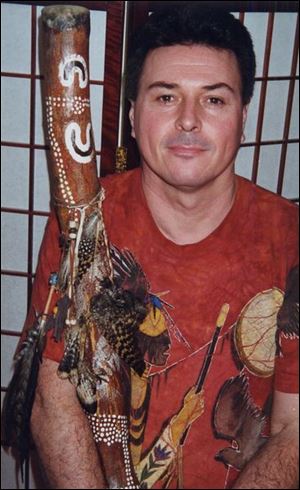
Musician finds spirituality in instrument
7/19/2003
Phil Jones cradles his didgeridoo, which is decorated with aboriginal symbols and is made from a piece of eucalyptus tree hollowed by termites.
Phil Jones played a variety of musical styles over the years, including blues and rock and roll, but his music never had a spiritual dimension until he learned to play the didgeridoo.
The Australian wind instrument, made from a section of eucalyptus tree naturally hollowed out by termites, requires controlled, steady breathing similar to the steps used for meditation and relaxation, said Mr. Jones, who will be at First Church Unity tomorrow.
Science has shown that breathing exercises can increase lung capacity and oxygen intake, lower blood pressure, and relax the body and mind, Mr. Jones said.
“And if you have spiritual intentions with a relaxed mind and body, then spirituality becomes more accessible.”
Born in Sydney, the 54-year-old said he was always familiar with the didgeridoo, an instrument built centuries ago by Australian aborigines, but didn't start playing it until 14 years ago.
“I found it was not just a musical thing, but that it has other qualities to it. When I began to realize what was going on and how it affected me, I was able to focus on prayer and meditation.”
The didgeridoo is a drone instrument, similar in some ways to the bagpipes, and can play a single note for an extended period of time.
“They are different sizes, from different regions of Australia, and have exquisite artwork depicting the totems of the tribal groups in the regions where they're found,” Mr. Jones said. “The different keys and pitches are determined primarily by length, similar to the pitch of organ pipes in churches.”
Each didgeridoo takes about three months to make, starting from the time a suitable branch is found. Most cost between $150 and $350, he said, adding that he does not recommend the cheaper “commercial, generic, tourist ones.”
“It requires no musical background to learn this instrument,” Mr. Jones said. “I teach it intuitively. It is only one note, so we don't want to complicate it.”
After a quick lesson in how to produce a sound, the next step is meditation, he said. “The core of the instrument is using it to relax and access these states of deeper and clearer consciousness.”
Mr. Jones, who was reared in a Roman Catholic family, was a teenager when his group, the Unknown Blues Band, recorded a hit single in Australia called “If I Had a Ticket.” He later moved to England and was the lead singer of an art-rock band called Quintessence, releasing four albums on Island Records between 1968 and 1973.
“It was during that time that I connected with a Hindu master, and his influence changed my life for good. He changed my approach to spirituality.”
The Hindu master's teachings were “all-inclusive,” Mr. Jones said. “He never asked anybody to reject their background, and made us look at our previous religions in a much clearer light. I still consider myself a Christian with a strong connection to Catholicism.”
Phil Jones will demonstrate the didgeridoo at the 10:30 a.m. service tomorrow at First Church Unity, 3535 Executive Pkwy, and lead a workshop at the church starting at 1 p.m. The cost of the workshop is $20. Information: 419-537-1001.
- DAVID YONKE